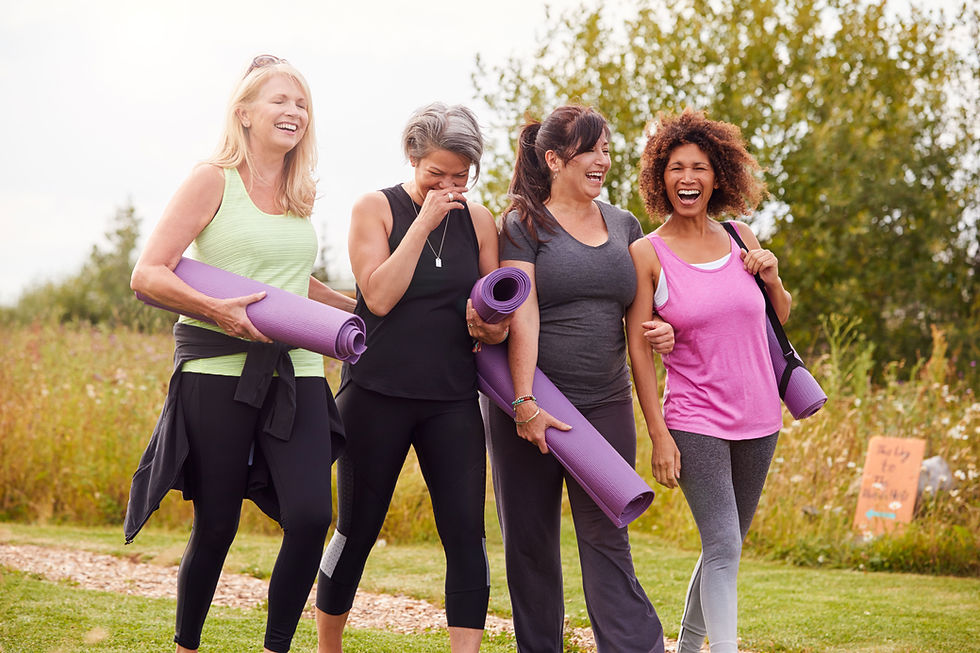Movement Is Wellbeing: A fresh perspective on engaging women in group exercise.
- EMD UK

- Jul 30
- 4 min read
As group exercise instructors, we’re used to thinking in terms of sets, reps, routines, and programmes. But what if the key to truly filling your classes, helping more women and girls move, wasn’t about intensity, structure, or even motivation?

What if it were about shifting how we frame movement altogether?
Movement is Wellbeing is a concept that challenges some of the traditional thinking around fitness – especially in how we engage women who feel left behind by the typical exercise narrative. It explores how small, simple changes in how we present movement can make a huge difference in participation, enjoyment, and long-term well-being. It is about changing our message and sharing a different message with our class members so that they can spread the message of movement and well-being in their communities.
It’s an idea rooted in evidence, empathy, and inclusivity, which might just change how you teach. As Dr. Paul Batman, our partner in developing EMD UK’s ‘Movement is Wellbeing’ programme, puts it: “Group exercise teachers… have a unique opportunity to impact the lives of countless women and their families”. This CPD-recognised training is a game-changer for group exercise teachers like you, offering a unique opportunity to lead the charge against physical inactivity on a global scale.
Why ‘not enough willpower’ is the wrong question.
So often, we assume that people, especially women, just need more motivation or willpower to stay active. But the science tells us something different.
As explored in Movement is Wellbeing, our instinct to conserve energy isn’t laziness at all – it’s deeply human and evolutionary. Our bodies are still wired for survival, not spin classes. Unless movement is pleasurable, social, or necessary, our brains are more likely to hit the brakes than press play.
That’s why traditional exercise messaging can fall flat for so many women, especially those juggling busy lives, health challenges, or a history of feeling excluded from classes. For you as a group exercise instructor, this often translates to inconsistent attendance, dropout rates and missing out on the immense satisfaction of truly retaining and reaching every woman in your community. Consider this: More women (34%) are inactive compared to men (29%), and over 2.4 million women in the UK find exercise and sport less enjoyable than men. Many women feel “not sporty enough”, lack confidence in a group setting, feel intimidated by facilities or are held back by body insecurities. This training directly addresses these common barriers, helping you design classes that genuinely welcome and keep them.

How reframing movement makes a difference.
This approach invites you to move away from “fitness-first” models and instead focus on key principles – often explored within the 8 reframed messages you’ll gain from this training. These include:
Autonomy - Supporting women to move in ways that feel right for them within your class and or daily life.
Competence - Helping them feel successful and capable in their own bodies, boosting their confidence to return to your classes week after week.
Enjoyment - Making movement something to look forward to, not endure, ensuring your sessions are engaging and popular.
Connection - Creating spaces where women feel safe, supported, and seen, fostering a loyal and thriving class community.
These factors, backed by both research and experience, are what truly drive long-term engagement. And as instructors, we’re in a powerful position to bring them to life. By understanding these principles and thinking out of the box, you’ll unlock new strategies to foster lasting participation and boost your participants' success.
What this means for your teaching.
Rather than seeing movement as a fixed routine, Movement is Wellbeing encourages you to explore:
Options outside the studio that resonate with different life stages, expanding your influence beyond class time. This will help women and girls keep moving between classes and therefore be more able to move in class.
Inclusive language that shifts the focus from appearance to wellbeing, making your classes more welcoming to diverse body types and fitness levels.
Ways to support emotional and social health through physical activity, deepening the impact of your group sessions outside of class and in local communities
How even short, gentle, or unstructured movement can be transformational, giving you tools to reach those who find traditional classes daunting.
You’ll be better equipped to reach the women and girls who may want to join in exercise but feel it is too far away from their current level, and help them build a healthier relationship with movement on their own terms.
If this resonates with you, there’s more to explore. The Movement is Wellbeing module is part of the Reach Up content library – a CPD-recognised resource, created in collaboration with This Girl Can to support group exercise instructors like you to connect with more women and girls, more meaningfully.
Through bite-sized learning, real-world insight, and practical strategies, you’ll gain new tools to make your sessions more inclusive, engaging, and impactful, directly addressing the challenges that some women and girls may face, which can prevent them from participating in group exercise.
You can sign up for FREE and start learning today. Enrol today and discover how to not just teach movements, but truly transform lives, leaving a legacy of sustained wellbeing in your community and building a more successful group exercise career.






Comments